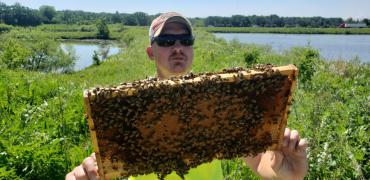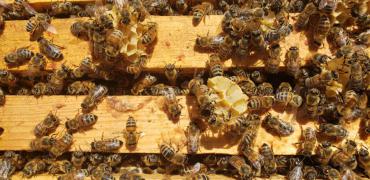National Pollinator Week: Engineering Hosts New Bee Hives
National Pollinator Week is June 21-27, 2021
For the first time, the City of Madison Engineering Division, will tend to bees this summer with new bee hives near Nesbitt Road and Maple Grove Drive.
Hosting bee hives helps the ecosystem and is a prime example of helping pollinators in our area as part of National Pollinator Week, June 21-27.
“Our purpose here is to ensure the health of native plants,” Engineering Division Greenway Vegetation Coordinator Maddie Dumas said. “The more we pollinate, the greater seed production we get. The more seed production we get, the more native plants we have.”
Engineering worked with Operation Fresh Start to safely move the bees and create custom bee hive boxes. The new addition of bee hives is just one of many things the City does to promote healthy pollinator habitat as a Bee City USA. The Engineering Division plants native plants and seed in rain gardens, ponds and greenways. The team also schedules timed mows and manages invasive species while promoting native plantings. The City of Madison became a Bee City in 2017, which committed our community to becoming a better place for pollinators to thrive.
National Pollinator Week From June 21-27, join the Engineering Division on social media to learn more about ways you can support our Bee City and pollinator habitat during National Pollinator Week. Check out the Engineering Division Facebook page and Twitter page to see a video as we bring you to the new Bee Hive Site and new, pollinator social media posts daily.
Get involved in National Pollinator Week
Video: Go to the City's newsest Bee Hive site
Follow our social media sites to join the celebration
Plant native plants, rain gardens and landscapes
Learn about Pollinators on the Engineering Division website
Apply for the Adopt-A-Median program
The Pollinator Partnership created National Pollinator Week after the United States Senate approved the celebration in 2007. Ever since, one week in June is centered on the importance of protecting pollinators from the risk of population decline.
Contacts
- Hannah Mohelnitzky, Public Information Officer, City of Madison Engineering Division, 608-669-3560, hmohelnitzky@cityofmadison.com


